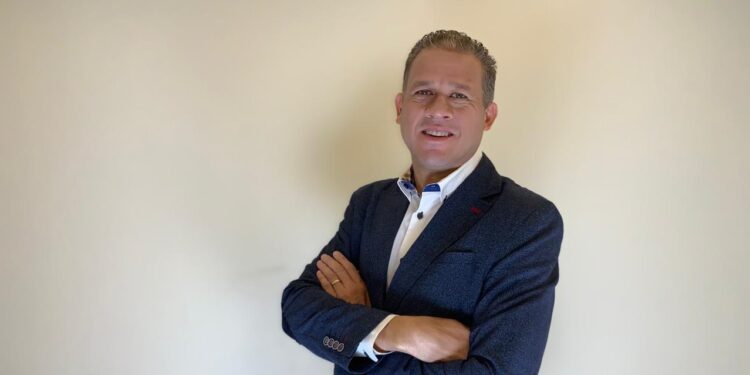Q1.How did you start your career in information technology and what led you to focus on Artificial Intelligence?
A. My career in Information Technology (IT) began with a growing interest in computing and solving complex problems. From an early age, I was fascinated by how systems work and how technology can transform the world around us, something that was still very embryonic at the end of the 90s. This led me to study areas such as programming, networks and databases, always seeking to understand the internal functioning of systems and their interactions. I learned that everything that exists in the virtual world is a reflection of what already exists in the real world.
My focus on Artificial Intelligence (AI) arose from an even greater curiosity about how we can create machines that simulate human thought, learning and decision-making processes. AI offers immense potential to solve complex problems and innovate in areas such as productivity and automation. The idea of working with systems that can “learn” and evolve autonomously is what really motivated me to specialize in AI. Already working in the area and being able to practically apply what I had been studying was a decisive factor for me to focus my career in this field, contributing to innovations in this field since the 2000s, in application areas such as Intelligent Truck Loading for Agribusiness and Integration of Points and Integration Systems for airlines around the globe.
Q2.What were the most memorable projects you led or participated in, and what was their impact on your career?
A. Over the course of his 27-year career, it is possible to mention some very interesting works, circulating across different lines of business and companies. It is possible to mention a project to automate fertilizer production and truck loading for agribusiness companies. In this project, the loading time and release of the product to customers was practically reduced by half, in addition to increasing revenue in production units by around 30%, which led to the pioneering project in artificial intelligence being copied by other competing companies at the time. In the transportation area, I worked on the integration of an airline with 38 other partners around the globe, a unique challenge and in another project in the Smart Cities area, I developed a smart manhole system used to monitor road clearance using AI in the 5th largest city in the world by demographic density, a pioneering project that even inspired the creation of a law. And finally, I also actively participated in the project to prepare the Rio de Janeiro subway for the Olympic Games
Q3.What was your experience like on challenging projects, such as preparing the Rio de Janeiro subway for the Olympic Games? What lessons did you take from this experience?
A. Participating and contributing in a unique and active way in the Project to accelerate the work of the Metro, which was built in Rio de Janeiro – Brazil, especially to allow the city to accommodate and host the Olympic Games in 2016, was an incredible experience, unique and with Certainly, a game changer in my career as I had the opportunity to directly impact one of the most important sporting events in the world and at the same time bring future benefits to more than half a million people every day, who came to use the enterprise we built. The development of algorithms linked to machine learning and applied to the project planning and execution processes made it possible to deliver the project in time for the Brazilian Olympic Games, an unprecedented and unique feat, receiving 1.2 million tourists and athletes from 206 countries. The work still became an active asset of the city, being used daily by more than 600 thousand people to this day. As a learning experience, it made me understand that working in a more organized and intelligent way, supported by new technologies to enable this, can have a gigantic and significant impact on crucial tasks and activities, bringing human achievements to a new level of excellence. Artificial intelligence is a reality and it is up to us to use it in the best way, to our advantage.
Q4.What were the biggest challenges you faced when implementing AI solutions, especially in early periods, such as the 2000s, when the technology was still in less advanced stages?
A. In the 2000s, when Artificial Intelligence technology was still in its early stages, the biggest challenges when implementing AI solutions were related to several factors, including technological limitations, lack of resources, and a still-developing understanding of how to apply these technologies in a sustainable way. practice.
The limitations of computational power, in the 2000s it had much less power compared to today and this naturally limited the implementation of more complex AI algorithms. The lack of mature tools and libraries today (ie: TensorFlow, PyTorch) made the work much more manual and highly based on “trial and error” methods or the researchers’ own previous experiences, which made projects more complex and time consuming. Problems of interpretability and transparency were also common, with data often seen as “black boxes”, that is, difficult to understand and interpret.
This entire scenario commonly led to a lack of understanding and organizational resistance, that is, we found companies skeptical about the applicability of AI and the return on investment in their solutions. There was a lack of understanding about how AI could be applied to solve real business problems, as organizations were used to more traditional solutions and convincing stakeholders and gaining the necessary support for AI projects was a major challenge.
Despite these challenges, the experience accumulated in the 2000s helped pave the way for what we see in AI today. Improvements in computing power, the creation of new algorithms, and greater data availability have helped overcome many of these barriers. However, the initial obstacles were crucial to understanding the limitations and needs of the field and thus guiding the innovations that have led to the rapid advancement of AI in recent decades.
Q5.You developed a project that resulted in a law. Can you tell us more about this? What were the social and technological impacts of this initiative?
A. It was an innovative and pioneering project that consisted of real-time monitoring of manholes on urban roads, part of the Smart Cities initiatives in the city of São Paulo, in Brazil. The project’s unique innovation brought together Artificial Intelligence, machine learning, Internet of Things (IoT) and even the creation, prototyping and pioneering manufacturing of the sensors used in the project. These sensors were installed in strategic manholes and, when monitored, informed us in real time which ones should be cleaned and thus avoid clogging and flooding of strategic avenues in the city. The system used several interconnected databases, historical data and incremental database as a starting point for analyzing and learning the models and the accuracy of the algorithm was also increased and optimized with its continuous use.
The results in decongesting strategic points in the city, showing significant improvements during rush hours shortly after implementing the system, led the city to create a law (PL586/2015) that began to require the application of a similar technological solution in future consortium contracts. and companies cleaning and maintaining the city’s public roads. Furthermore, the solution was also replicated in other cities in the country in subsequent years, such as the cities of Campinas – SP, Santos – SP, Curitiba – PR, Salvador – BA, São José dos Campos – SP and São Bernardo do Campo – SP .
Anyone in my position, I believe, would be honored to have contributed to this achievement. São Paulo is the fifth most populous city in the world, with more than 16 million people in its metropolitan region and 8 million vehicles circulating daily, it has chaotic and intense traffic and this project brought optimization and drastic reduction of traffic in critical points of the city. city, contributing to greater traffic flow, especially at critical times. This was possible due to the innovative nature of the project, enabling a direct impact on thousands of people daily, bringing great social relevance and increasing the population’s quality of life.
Q6.How do you balance technical and ethical aspects when developing AI solutions? Have you ever faced situations where it was necessary to adjust projects to avoid ethical problems?
A. Balancing technical and ethical aspects when developing Artificial Intelligence solutions is critical to ensuring that the technology not only works efficiently, but is also responsible and benefits society fairly. In my work, I seek to integrate an ethical approach from the early stages of development, considering the possible social, economic and cultural consequences of each AI solution.
Allowing work to be transparent and explainable is a fundamental point in balancing ethics and technique. Using algorithms that can be clearly explained and audited so that you can understand how decisions are being made is essential to avoid discrimination or bias, especially in areas such as health and finance.
Concern for privacy and data security must also always be observed, implementing robust security protocols and following regulations such as GDPR (General Data Protection Regulation) to ensure that the data collected is treated ethically and transparently.
I have faced situations where it was necessary to adjust projects to avoid ethical problems. For example, in an AI project to analyze traffic lane unblocking services in cities, we identified that the model was inadvertently favoring roads in certain more financially active regions, due to biases in historical data. To fix this, we adjusted the data collection and training process, introduced techniques to balance the representations of different groups and regions, and implemented measures to ensure the model made fairer and more agnostic decisions.
These adjustments require not only technical skills, but also constant ethical reflection to ensure that the AI solutions developed are safe, fair and responsible. In many cases, this means that ethics needs to be incorporated into the development process from the beginning, rather than as an afterthought.
Q7.How do you see the future of Artificial Intelligence and which trends do you believe will have the greatest impact in the next 10 years?
A. The future of Artificial Intelligence is extremely promising and, in the next 10 years, I believe we will see significant advances in several areas, transforming even more radically the way we live, work, do business and interact with technology. Some trends that I believe will have the greatest impact are:
The Integration of AI with the Internet of Things (IoT) will allow the creation of smarter environments, where devices and systems will communicate and make autonomous decisions based on real-time data, generating significant impact in sectors such as health, transport, agribusiness and smart cities .
We will see multimodal AI models, that is, evolving into models that combine different types of data, such as text, image, audio and video. This will enable us to make major advances in more intelligent and flexible systems, capable of understanding and generating information in a way that is closer to human experience.
Quantum computing has the potential to significantly accelerate the processing power needed to solve complex AI problems such as optimization and simulation. At the same time that we will have more complex problems being solved with this integration, we will also have the development of autonomous AI and decision systems, we will see more autonomous systems (i.e.: vehicles, machinery, sensors, drones and robots capable of making decisions independently in real time, bringing major innovations in sectors such as transport, logistics and production system chains.
We will have increased intelligence combined with advanced automation in systems and equipment, making it possible to complement and improve human intelligence, helping to make better decisions in business and helping to solve complex problems in areas such as scientific research, medicine and education.
In short, the future of Artificial Intelligence will be marked by the continuous evolution of its capabilities, with an increasing focus on more ethical, efficient and integrated solutions. Automation trends using AI ethically will advance to new frontiers such as quantum computing and personalized healthcare and will have a profound impact on our society, faster than we see today, further transforming not only the way we interact with technology, but also how it shapes our lives.
Q8.With the advancement of generative AI, how do you believe this technology will influence business and creativity? Are there any concerning or promising impacts you would like to highlight?
A. The advancement of generative has the potential to profoundly transform several sectors, especially in the fields of business and creativity. This technology, which can generate original content such as text, images, music and videos based on existing data and standards, will impact the way companies operate, create products and interact with customers.
As promising impacts we can mention the acceleration of innovation and personalization, where companies will increasingly have the capacity to produce on a large scale and still be able to generate products that are linked to the preferences of each type of consumer. Productivity will be increased, as repetitive tasks can be done faster and faster, favoring creativity, as the professional will be able to focus on tasks with greater added value. Without a doubt, the great promising impact will also be on the creation of new business models. Imagine the number of new businesses that have already been created with this technology and those that can still be created. New content generation platforms, such as automatic text generators, design and even artistic productions, are allowing companies to generate large volumes of content cost-effectively and in real time. This creates new opportunities for companies looking to explore these services, such as on-demand content creation platforms or automated personalization solutions in any industry.
Talking about worrying impacts, I see the concern with the quality and authenticity of the content generated, which could allow the saturation of low-quality or repetitive content, which could create difficulty in distinguishing between human and automated work, damaging originality and authenticity in the creative field. . From this point on, we must be careful with ethics and the possibility of manipulating content with potential use for a negative bias, misinformation or negative impact on society.
The future of generative AI is fascinating and has great potential to drive innovation in business and creativity, but it also brings with it challenges that will need to be approached with caution. The central point will be the balance between automation and efficiency gains with the preservation of originality, ethics and quality of human work, which will be a great challenge. As with any technological advancement, the impact of generative AI will depend on how it is managed, regulated and integrated into society.
Q9.What are your next steps in the field of Artificial Intelligence and what would you still like to accomplish in your career?
A. I believe that the future of AI professionals will be shaped by constant innovation, specialization in specific areas and a greater emphasis on ethical and collaborative issues and I see myself included in this. I intend to continue participating in projects that interest me as they have great relevance for humanity and practical and promising applications in essential areas. I intend to work on research and application of ARtificial Intelligence combined with other emerging technologies.
With my experience in the area, I also intend to have an increasingly active role in sharing what I have learned with other professionals and enthusiasts and new generations, whether by collaborating in scientific publications, participating in seminars, conferences and workshops, writing literature in the area and participating in discussions and associations about Technology and Artificial Intelligence.
Q10.What advice would you give to aspirants who want to build a successful career in Artificial Intelligence and Technology?
A. For those who want to build a successful career in Artificial Intelligence (AI) and Technology, the path can be challenging but extremely rewarding. I can share some advice based on my experience in the area over the last two decades. I believe we can divide the councils into two groups, one focused on technology and the other on human capacity.
In the area of technology, I would mention studying technology in a basic, solid and incremental way. Understanding algebra, calculus, probability and statistics are fundamental. Keeping up to date with new technology trends and understanding and knowing how to apply programming languages will also make a difference and having practical experiences, that is, having a holistic view and trying to apply in the real world, solutions based on what you are learning will make all the difference. difference. All knowledge is only useful if it is used to optimize processes and products and advance humanity.
In the sphere of human capabilities, I would mention the focus on the development of soft skills, such as communication, teamwork, problem solving, logic and critical thinking. Things that we learned decades ago in a more classical way have not lost and will not lose their importance and will be crucial even when working with high technology. Developing a network of contacts, understanding the social and ethical impact of what you are producing and knowing how to correlate data and situations will always give you competitive advantages to become a better professional.
A career in Artificial Intelligence and Technology offers immense opportunities for those who dedicate themselves and prepare adequately. Being persistent, not fearing hard work to develop a new solution, opting for the trial and error method as many times as necessary, being curious and never stopping learning are unique skills, available to anyone and that will certainly bring you results in different spheres. of his training as a professional and human being.





























